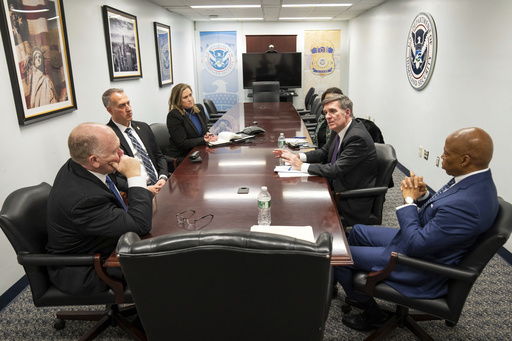
The Justice Department has made a significant move to seek the dismissal of corruption charges against New York City Mayor Eric Adams. This request, submitted to a court, comes after federal prosecutors in Manhattan resisted calls to drop the case and some prosecutors chose to resign in opposition to the directive. Acting Deputy Attorney General Emil Bove, alongside colleagues from the public integrity section and the criminal division, filed a motion asserting that the ongoing case is marred by perceptions of misconduct and could unduly impact Adams’ upcoming reelection efforts. A judge will ultimately need to ratify this request.
This development unfolded shortly after Bove initiated a conference call with prosecutors tasked with handling corruption cases, urging them to rapidly decide on endorsing the motion to dismiss. Reports indicated that Bove suggested that those willing to sign on could be considered for promotions, leading to a wave of resignations among the team that was reluctant to follow through. However, a senior prosecutor stepped in to protect the careers of junior staffers, as detailed by a source who remained anonymous due to the private nature of the discussions.
The dismissal motion, which bears Bove’s signature, also includes endorsements from key officials Edward Sullivan and Antoinette Bacon. Notably, none of the prosecutors from the Manhattan office, which had originally filed the case against Adams, signed the request. This situation highlights an ongoing tension between the Justice Department hierarchy in Washington and its Manhattan division, known for its independent stances on high-profile issues like political corruption and financial misconduct.
In an unusual turn of events, the dispute has led to the resignation of at least seven prosecutors from both the Manhattan and Washington offices, including the acting U.S. attorney for Manhattan and the head of the public integrity section. As communicated in their filing to Judge Dale E. Ho, the Justice Department is interested in potentially refiling the charges after the imminent vote in November. Adams has a tough Democratic primary contest looming in June with multiple challengers already gearing up, as his trial was anticipated to commence in the spring.
Bove expressed the belief that pursuing charges against Adams might hinder the mayor’s governance, asserting that it poses “unacceptable threats” to public safety and the implementation of federal immigration policies. The motion points out that the case has precluded Adams from accessing vital information necessary for safeguarding the city.
In September, Adams denied allegations that he took over $100,000 in illicit contributions and extravagant travel perks from foreign entities seeking to influence him during his time as the Brooklyn borough president while campaigning for mayor. Over recent months, Adams has occasionally aligned with Trump, even visiting the former president’s Florida golf club, where Trump has spoken out against the allegations facing Adams and hinted at a possible pardon for the mayor.
Bove earlier instructed Sassoon to discontinue the case, emphasizing the mayor’s crucial role in the ongoing efforts to regulate immigration under the Trump administration. Sassoon, however, chose to resign rather than comply with this directive, echoing similar sentiments from a group of Justice officials in Washington. Her correspondence to Trump’s newly appointed attorney general expressed concerns that the presiding judge would rigorously scrutinize the rationale behind any dismissal.
A group of former Manhattan U.S. attorneys, including notable figures like James Comey and Mary Jo White, publicly praised Sassoon for her commitment to legal integrity. On Friday, a Manhattan assistant U.S. attorney involved in the Adams case also resigned, openly criticizing Bove while highlighting the ethical complications surrounding the decision to dismiss the charges.
The assistant’s resignation letter emphasized that accepting Bove’s demand would betray the principles of governance and justice, reiterating a tradition of resigning to prevent serious errors in the legal process. The letter underscored that leveraging prosecutorial power for political advantage is incompatible with the rule of law. In the meantime, Adams and his legal counsel have firmly denied any allegations regarding potential quid pro quo agreements related to the case.
Following these developments, the legal battle surrounding Adams continues to unfold, especially amidst shifting dynamics within the Justice Department itself, as many remain focused on the implications of this case on the forthcoming election cycle.

